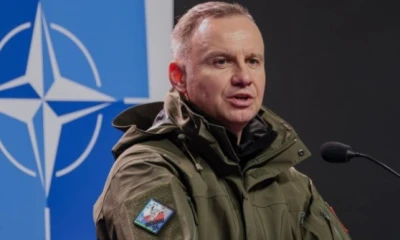Polish President Andrzej Duda called on NATO members to raise their defence spending to 3 per cent of their gross domestic product-GDP in response to Russia’s invasion of Ukraine. Duda stressed upon the need for bold and uncompromising actions in the face of Russia’s growing imperial aspirations.
This appeal coincides with Poland celebrating the 25th anniversary of its accession to NATO on March 12, 1999. Duda expressed pride in Poland’s NATO membership, stating the alliance is a crucial guarantor of security, particularly highlighted by the ongoing conflict in Ukraine.
Duda acknowledged the leadership role of the United States in European and global security. However, he stressed other NATO countries must assume greater responsibility for the alliance’s security and prioritize the modernisation and strengthening of their armed forces.
Poland, notably, already allocates 4 per cent of its GDP to defence, making it the member with the highest percentage spending in NATO. The call for increased defence spending comes at a time when most NATO members, including Germany, are still working towards meeting the agreed-upon benchmark of 2 per cent of GDP set in 2014.
In a related development, Sweden’s flag was raised at NATO headquarters in Brussels, officially marking its status as the 32nd member of the trans-Atlantic alliance. Finland had joined NATO the previous year. Duda acknowledged the historic significance of these events, highlighting the need for further bold decisions to strengthen NATO.
In response to Duda’s call, the Biden administration suggested that the focus should be on getting every country to meet the 2 per cent spending threshold before considering additional proposals. The US State Department highlighted the progress made in this regard but hinted at the current ambition being possibly too high.
President Duda is set to visit the White House, where he will meet with US President Joe Biden and Polish Prime Minister Donald Tusk. Following this, Duda will travel to Brussels for a meeting with NATO Secretary-General Jens Stoltenberg, underscoring the importance of unified efforts within the alliance during these challenging times.

















